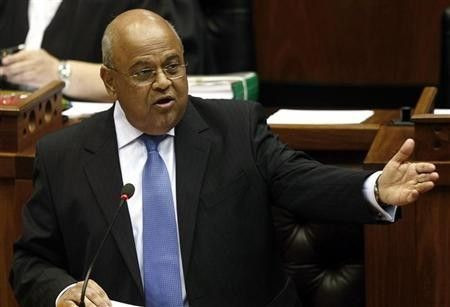S.Africa throws Swaziland $370 mln lifeline

South Africa has agreed to a 2.5 billion rand bailout for Swaziland to help it through a budget crunch that had prompted unprecedented protests against Africa's last absolute monarch, officials said on Wednesday.
South African Finance Minister Pravin Gordhan said the first slice of the loan would be dispersed this month, buying crucial time for King Mswati III, whose unelected administration has been running through the central bank's reserves to pay public sector wages.
To the disappointment of the British-educated monarch's opponents inside and outside the impoverished state, the aid will not be tied to reforms such as unbanning political parties or releasing Swaziland's five prisoners of conscience.
"It's not in our interest to have an economy in trouble that could place a burden on the South African government," Gordhan told reporters.
Pretoria hopes Mswati, who has at least a dozen wives and an estimated personal fortune of $200 million, would "create space" for political dialogue, Gordhan said, but added: "It's not our place to dictate to them."
Such comments could land him and President Jacob Zuma in political trouble given the ill-feeling in South Africa towards Mswati, who has run the landlocked nation of 1.4 million people as his personal fiefdom for more than two decades.
"We should not waste this opportunity to contribute to the democratisation of our neighbour by using our economic leverage," the opposition Democratic Alliance party said.
The Swaziland Solidarity Network, a dissident group based in South Africa, described the loan as a "betrayal of the people", while South Africa's powerful COSATU labour federation said the aid should be used as a political tool.
"It is not democratic, and people are suffering. South Africa should impose conditions which will facilitate democracy and could lead to the unbanning of political parties," COSATU President Sidumo Dlamini said.
LAST DITCH
Swaziland's fiscal problems stem from a 2009 recession in South Africa that triggered a collapse in revenues from the SACU regional customs union that has historically accounted for two-thirds of Swaziland's budget.
The government has kept its head above water by using central bank reserves, which now stand at just over $500 million, and running up at least $180 million in unpaid bills.
In the face of a Greece-style budget crisis, Mswati tried and failed to get cash from the International Monetary Fund, which refused to hand over anything without seeing major cuts to what is officially Africa's most bloated bureaucracy.
"We are thankful, and also appreciate the assistance we have received from South Africa," Mswati was quoted as saying in the Times of Swaziland newspaper. "This shows that they are good neighbours."
The loan will buy him some time but will not resolve what the IMF says is the crux of the country's problem: a civil service wage bill that consumes 18 percent of GDP.
"They needed a bridge loan like this to get them into next year when the SACU revenues might look a bit better," said Christie Viljoen of NKC Economists in Cape Town.
"But as long as they don't cut their civil service staff, they're not going to get money from the likes of the IMF."
© Copyright Thomson Reuters {{Year}}. All rights reserved.





















